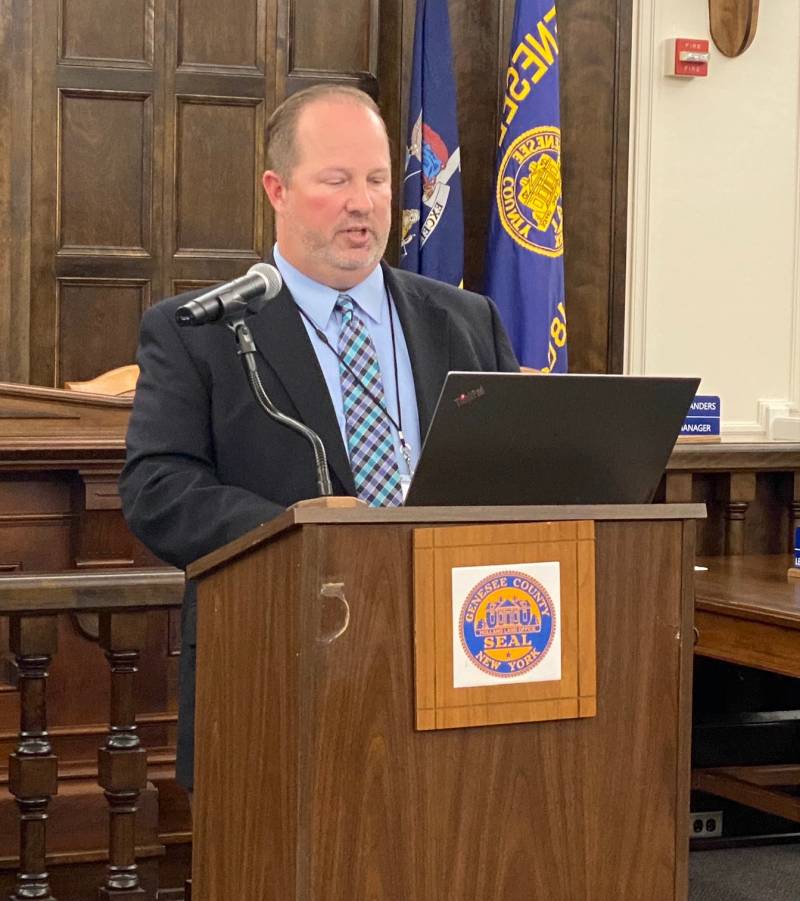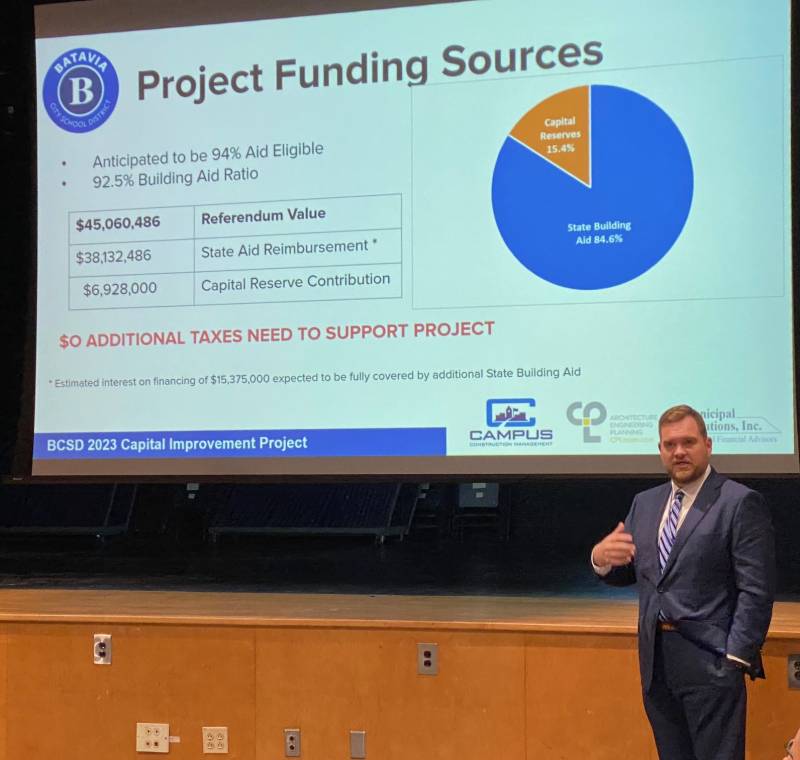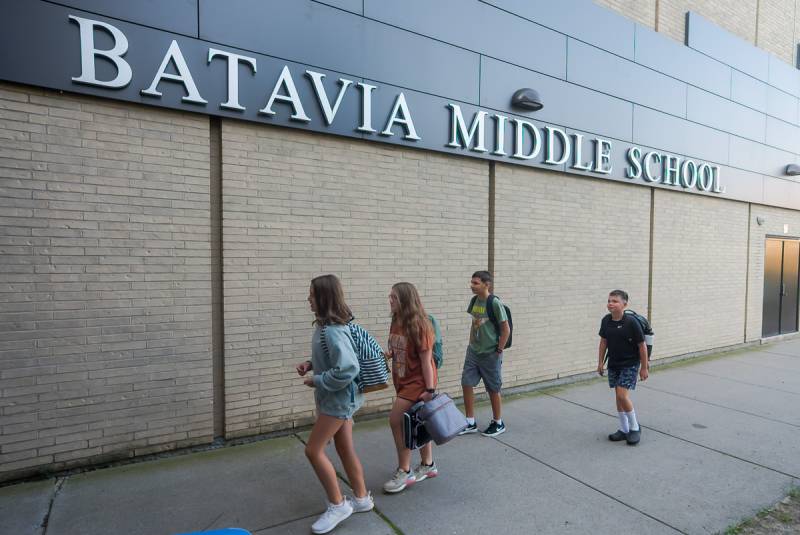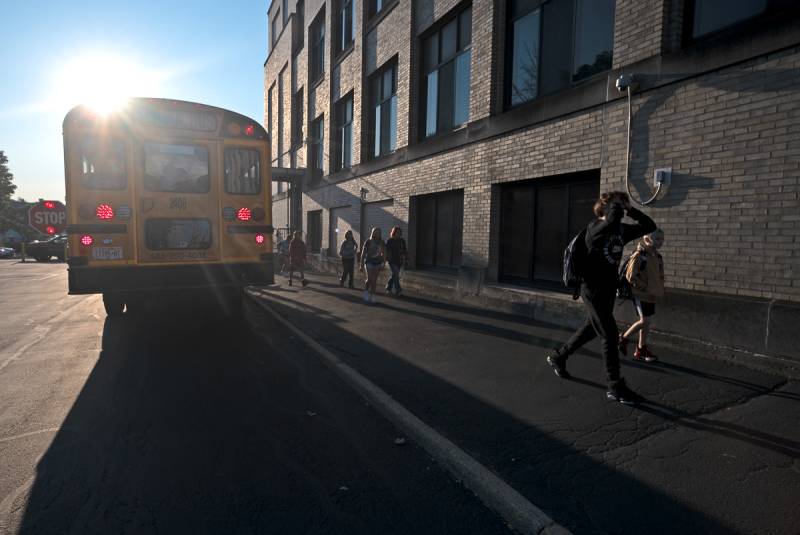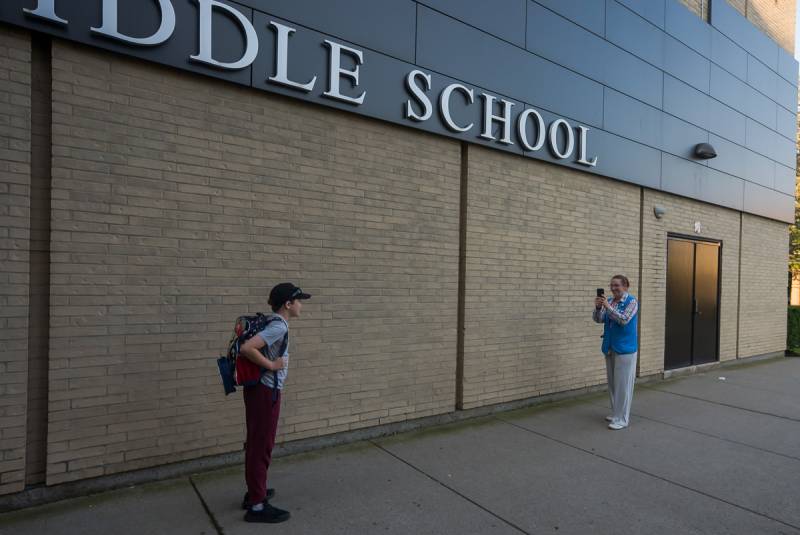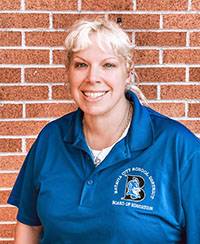There may be a newcomer to this year’s Board of Education election, however, he’s no stranger to the city school district.
Retired Athletic Director Mike Bromley will be joining incumbents John Reigle, Jennifer Lendvay and Korinne Anderson in the pitch for three vacancies on the school board during this year’s budget and board election vote on May 21.
“Although I have never served on an elected board, I possess extensive experience in committee roles. I have been a longstanding member of both the Section V Athletic Council and the Executive Committee of the Monroe County Public School Athletic Conference. Additionally, I have chaired the Wellness and Schedule C Committees for the Batavia City School District. I take great pride in having initiated the Batavia Blue Devil Athletic Hall of Fame and have chaired this committee for two decades,” Bromley said Thursday to The Batavian. “As a former student, teacher, coach, administrator, and, most critically, a parent, I have greatly benefited from the educational system. My children's success as adults is a testament to their experiences within the BCSD. Now retired, my commitment to serving the school community persists, and a role on the Board of Education would allow me to remain active in the educational process.”
The Batavian asked all of the candidates questions about their run for a seat on the board. Bromley’s questions were slightly varied since he was not running again for a seat, and here are Mike Bromley's responses.
Who will you represent?
Effective school board members work collaboratively, fostering respectful and positive interactions with students, staff, and the community. It is essential for board members to develop robust communication channels that engage all stakeholders in the pursuit and realization of district objectives. I am committed to representing all stakeholders.
What do you feel are the biggest challenges for the city school district?
In challenging economic times, strategically managing resources while providing a premier educational experience for our students is a top priority. Cultivating positive relationships across the district is of utmost importance.
Why do you deserve a vote more than one of the incumbents? What will you bring to the board that’s different?
Every BOE candidate merits recognition and esteem for their dedication to our educational community. My campaign is not a contest against the incumbents but rather a reflection of my belief in what I can contribute to the district. With over 36 years of educational experience, I am confident that my background will be beneficial in propelling the district forward.
John Reigle, the board’s current vice president, gave the following responses:
Why do you want to run again?
I am passionate about creating a positive impact in my community, and as a lifelong Batavian, I am dedicated to improving our schools and making Batavia an excellent place for families, teachers, and staff to thrive. I want to run again to continue my commitment of enhancing our educational system and ensuring that every student in Batavia receives a high-quality education.
What do you feel you accomplished while on the board so far?
Serving on the Board has given me the opportunity to advocate for our students, families, teachers, aides, clerical and custodial staff, and the community. I am proud to have contributed to the development of our District's five year Strategic Plan and be part of the hiring process of our current Superintendent, Mr. Smith, who is dedicated to making BCSD the best it can be. While being an active member of our Building & Grounds committee, I am also proud to have been part of the recently approved BCSD Reimagined capital project which includes shifting our grade levels to better serve the district.
Who do you represent when you’re on the board?
As a dedicated Board member, I represent the voices and interests of various stakeholders within our district. Most importantly, this includes our students, who deserve a high-quality education, as well as our district staff and community members, who rely on us to ensure we make fiscally responsible decisions that benefit everyone. I take this role very seriously and plan to continue to be visible and to listen to our community in order to stay connected in all of our schools.
What are the district’s biggest challenges moving into 2025 and beyond?
As we look to the future, the district's biggest challenges include maintaining a balanced budget while providing our students with the educational opportunities they deserve. This will require us to be proactive in seeking out new revenue sources, such as grants and partnerships, and to be strategic in our use of resources. Additionally, we must continue to invest in our teachers. I believe all students can learn and I am committed to helping and taking on the challenge to ensure every child has a bright future by investing in our teachers and staff. I want to be sure they are provided with support to be equipped with what they need to support our students.
Please include any comments about why being a board member is important to you.
As a Board of Education member, I believe it's important to be engaged in the community where I grew up, live and attended school. The Batavia school district is where my older children formally attended and now my youngest son attends. Being a board member gives me the opportunity to be part of the positive solution and not just the negative complaints. I have and want to continue to make a difference for our community and schools. I enjoy attending various sporting events and engaging in the community to support a variety of events. When I attend events like Mr. Batavia, I feel proud that I show my support as a board member. There are so many great things happening at each school to be proud of. Everyone is working together to make the transition from each school seamless. We have a great district with amazing students and staff, and I'm committed and excited to be a part of the continued success.
Jennifer Lendvay’s responses:
Why do you want to run again?
I am running again because I feel it’s important to be part of the process rather than just a spectator.
What do you feel you accomplished while on the board so far?
While on the board I’m pleased to have been part of the hiring our current superintendent, and having increased our SRO’s and worked on improving safety.
Who do you represent when you’re on the board?
As a board member we represent the students, staff, parents, and community members.
What are the district’s biggest challenges moving into 2025 and beyond?
I feel the biggest challenges moving forward are making sure we have a consistent balanced budget while continuing to support our students with their educational needs.
Please include any comments about why being a board member is important to you.
Being a Board of Education member is important to me for the reason stated above, along with the importance of giving back to the community.
Korinne Anderson’s responses:
Why do you want to run again?
I want to run again because I want to continue to further the impact I have made. I also believe that the budget will be another challenge next year and I believe myself and the existing members should remain on because we all work really well together.
What do you feel you have accomplished while on the board so far?
We know the issues facing us next year and are ready to work together again.
While on the board I feel that I have been able to support teachers, hear their voices and opinions along with students, staff and the community. I also have enjoyed attending numerous activities throughout the district in the last 2 years.
What are the biggest challenges moving into 2025 and beyond?
This year’s budget was a challenging one and I believed my fellow board members worked hard to balance it with everyone’s needs in mind.
Who do you represent when you're on the board?
I have had three children in BCSD and still am here wanting to help the students , teachers staff and taxpayers. Many different facets I represent while on the board. A mom, a taxpayer, a former aide. I can see many different views of the school issues.
Please include any comments about why being a board member is important to you.
I am so thankful for the education and life lessons my children learned while at BCSD. It has been a great foundation for my children. I want to give back and help the district continue to improve.
Batavia City School District residents will be voting on a $60,294,755 budget that includes a 2.26% property tax increase and for three out of four candidates for school board on May 21.
That property tax increase reflects a 39-cent increase per $1,000 assessed valuation, or an increase of $48.75 per year on a home assessed at $125,000.
According to the latest budget presentation, the 2024-25 budget maintains the current educational program and extracurricular offerings; provides additional instructional resources, social and emotional services; reduces staffing as a result of loss of COVID funding, enrollment, attrition and state aid; has a tax levy increase of 2.26 percent that’s within the tax cap; and aligns with the district’s strategic plan.
The tax levy of $20,339,336 is an increase of $450,345 or 2.26 percent more than this year’s budget.
The transportation contract calls for a $556,263 increase for $3.3 million, a 20 percent increase, and a general support increase of $514,943, and an employee benefits increase of $313,405, for a total raise in expenses of $1,323,981.
A mental health grant is used to add back three full-time instructional coaching and two full-time emotional learning positions into the budget.
The ballot includes Proposition #1 to approve a general budget of $60,294,755 and to vote for three board members.
A public hearing presentation will be at 6 p.m. May 14 at the District Office at the high school, 260 State St., Batavia. The vote is from 11 a.m. to 9 p.m. May 21 at Batavia High School, 260 State St., and Robert Morris School at 80 Union St., depending on the voter’s residence.
For residents living north of Route 5 (Main Street), vote at Robert Morris, 80 Union Street (Multi-Purpose Room). Enter on Union Street at the entrance across from Notre Dame.
For residents living south of Route 5 (Main Street), vote at Batavia High School, 260 State Street (High School Library).
If you need clarification on where to vote, check the street-by-street guide on our website or call the Business Office at 585-343-2480, Ext. 1002.




